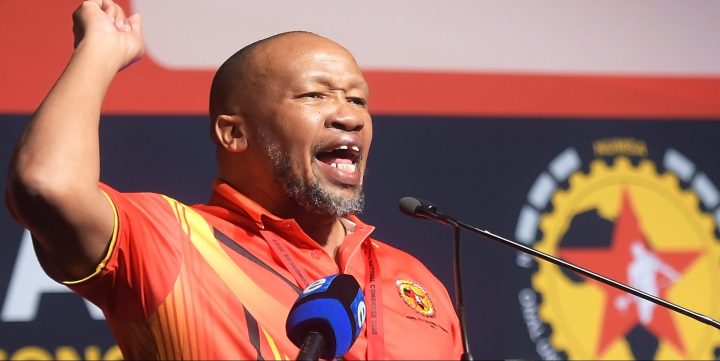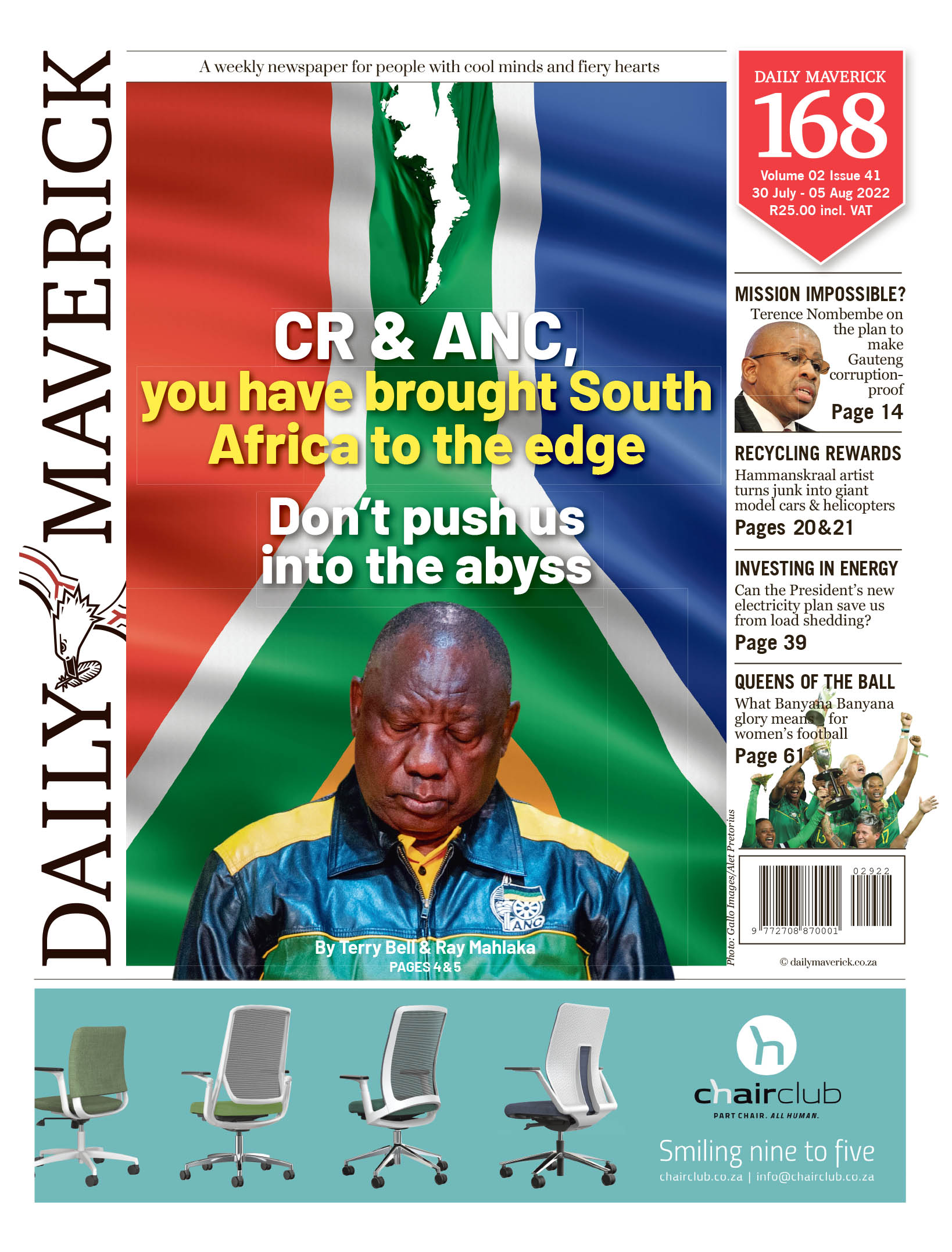ANALYSIS
What happened at Numsa shows SA faces dangerous threats – even potential civil war

In several ways, the Numsa congress debacle brought into focus the dangers, particularly of manipulation, fragmentation and potential for violence that threatens South Africa.
An “Arab Spring” threatens South Africa, former president Thabo Mbeki warned last week. But he was wrong. The threat the country faces is much more dangerous: violent fragmentation fuelled by ethnic nationalisms – even potential civil war.
That is the worst-case scenario, which, if it is to be averted, a united trade union movement would have a major role to play. Because unions, for all their faults, are fundamentally democratic organisations, their members embedded in communities, and they are, for the most part, examples of unity in diversity.
That is the view of several senior trade union leaders, including Karl Cloete, the former deputy general secretary of the National Union of Metalworkers of SA (Numsa).
It was Numsa’s controversial and interdicted national congress that spluttered to an end at Cape Town’s International Convention Centre this week. And it did so amid threats of its leaders being arrested for contempt of court.
The interdict was delivered by the Labour Court after an application brought by a group of Numsa officials who had been suspended by the union leadership. This was held to have been contrary to the union’s constitution. Between 30 and 50 regional officials and shop stewards, labelled “rogue elements”, along with the entire Mpumalanga region of the union, were barred from attending the conference.
SA is still a parliamentary democracy
This legal backdrop provided a clear example of the difference between “Arab Spring” countries, especially Tunisia and Egypt, where anger against dictatorships ignited popular uprisings aimed almost solely at toppling governments, and South Africa.
South Africa remains a parliamentary democracy, but one where state power is in disarray, with the governing ANC rent by factionalism and clearly losing support.
Getting to Parliament, into government or close to the feeding trough of state patronage is the current domestic target, not only for existing political parties, but also for a range of local opportunists, ideologues and idealists. However, there is also evidence of possible external influence in support channelled to local groups by foundations linked to China and the US.
Outside influence and manipulation
Numsa was behind the creation and launch of the Socialist Revolutionary Workers’ Party (SRWP) that stood in the 2019 elections, with union general secretary Irvin Jim as its main candidate. Though the union at the time had around 300,000 members, the SRWP garnered just 24,349 votes. However, the SRWP still professes to be “the vanguard party of the working class” and is apparently seeking, despite official denials, links with the South African Communist Party (SACP).
Ideological rifts have opened, with allegations of external interference and manipulation. In the past, the Chinese Communist Party has provided funding to the SACP, and China-based former IT tycoon and professed socialist Neville “Roy” Singham has close ties with Numsa. Singham was the donor behind the controversial recent closure of online publication New Frame. Here is plentiful fuel for conspiracy theorists, along with the fact that the US is helping to upgrade South Africa’s army.
But, whether funded or not, at a local political level different groups are trying – along with established political parties – to find ways to mobilise the voting masses in order to at least gain seats in Parliament. Also to win, perhaps, a bit part in what seems certain to be the coalition government of the near future.
In several ways, the Numsa congress debacle brought into focus the variety of machinations under way and the dangers, particularly of manipulation, fragmentation and the threat of violence that some of these pose. The question of how the admitted R39-million bill for last week’s shambles has been financed was one of the answers being demanded by many Numsa members.
Among the costs was the hire of two companies of uniformed private security guards who kept tight control over every entrance and the foyer of the centre. The union leadership maintains they “fundraised” to pay for the congress. But a 2018 investigation by Deloitte, which emerged in court documents when Numsa-owned life insurer 3SixtyLife was placed under curatorship in December last year, unearthed the fact that the union’s investment company had provided up to R20-million in “sponsorships”.
Given this background, along with the relationship with Singham, Western Cape delegates who attended the interdicted gathering demanded clarity about the financing and the state of the investment company. When they got no answer, they walked out.
Some of these delegates were among those who questioned whether Singham’s money – and his influence – was behind the tone of the statement in the introduction to the union’s secretariat report: “The war the United States and its Nato Western Europeans allies are waging against Russia using Ukraine as a proxy…”
‘Enemies of the working class’
There is also more than a hint of paranoia, with an official Numsa statement castigating the media and naming certain journalists as “enemies of the working class”. The union also claims that a cabal of non-governmental organisations is plotting to take over the labour movement.
This incendiary rhetoric comes hot on the heels of the victory at the KwaZulu-Natal ANC congress of the generally younger “Radical Economic Transformation” (RET) faction that refers to itself as the “Taliban”. They refer to “enemies” in a province that has recorded the highest number in a rising rate of politically motivated assassinations.
The Taliban and the RET, though playing largely on ethnic nationalism, are one of the groups battling for what some commentators still ironically call the “soul” of the ANC. But, for them, this soul needs to be under the guidance of Jacob Zuma.
Groups such as Defend Our Democracy also recognise that the ANC will probably fall below 50% of electoral support in 2024 and wish to rescue “our glorious movement”. They look to the era of Thabo Mbeki and tend to cling to the image of a pre-Jacob Zuma past when mythical probity dominated.
Xenophobia gains currency
However, as numerous surveys have shown, increasing numbers of the voting public are disillusioned with not only the ANC but all established parliamentary parties.
In this environment, xenophobia has gained strong currency, and foreign African nationals are still prime targets for groups such as Operation Dudula. In only milder form, anti-foreigner sentiment is regularly used by establishment politicians like Herman Mashaba.
The third-largest party in Parliament, the Economic Freedom Fighters (EFF), sometimes professing, almost in the same breath, Africanism, Pan-Africanism and Marxism, has also attempted to gain inroads in representing the “left” and “socialism”.
In fact, undefined socialism seems to be the prime slogan among the various putative political alternatives that are emerging. Even North West ANC strongman and former premier Supra Mahumapelo, regarded as being close to the RET faction, this week called for “developmental socialism”.
It is a welter of jargon on one side and waffling promises on the other. But there are no serious proposals to alleviate the increasing poverty, desperation and anger mentioned by Mbeki as the fuel for social and political conflagration. DM168
Terry Bell is a journalist, editor, former political detainee, and lifelong trade unionist. He was in exile for 26 years and was the founding principal of the primary division of Somafco, the ANC’s Somafco school for exiles in Tanzania.
This story first appeared in our weekly Daily Maverick 168 newspaper, which is available countrywide for R25.





















 Become an Insider
Become an Insider
Bell’s inflated importance of NUMSA is misplaced. In the scheme of things should it implode, what possible positive contribution would otherwise go abegging. If they are no more, so what!? Another ill-fated Union (NUMSA 2.0) will rush to the workers’ feeding trough.
NUMSA, as the cANCer, is riven by factionalism and rent-seeking. Both have been, is and forever will be all about self-serving interests!
Salvation from poverty and unemployment lies least in the hands of NUMSA or its Leninist commentariat – no one cares, nor should they !
The West German constitution adopted in 1949 recognized the damage done by both extreme left and right fundamentalist political Parties in Germany.
The wording of what parties had to adhere to and their privileges is such, that within a few years all Neo Nazi and Communist parties were banned.
Party’s policies, aims and rhetoric have to abide by and further the Constitution and not undermine the wellbeing of the country and residents.
SA with a similar destructive history of far right (NP) and far left (ANC/SACP) political hegemonies, should really introduce similar wording in our constitution.
Not all freedoms of expression can be allowed, especially those that seek to harm a peaceful nation and coexistence.
I like the idea but I feel our constitution should be kept simple. The consequences of such issues should in theory be guarded against by the rights already enshrined in it. It may be too late by then so this should be explicit in our Electoral act. Something else that should be added is what they have in Equador, religion may not be used in electioneering- no Church visits and support, nor claiming divine right to rule. Lots to learn from other nations.
The more of this I read the more I think, why should we not care. RET, Taliban, Chinese (aka Maoist) factions, what a load of political trash.
All Unions play a major role in democracy with the exception of Numsa!
Mr Bell, well said!
Unions are part of the problem as they have no agenda to promote the interests of the unemployed and have fairy land communist ideology underpinning their views.